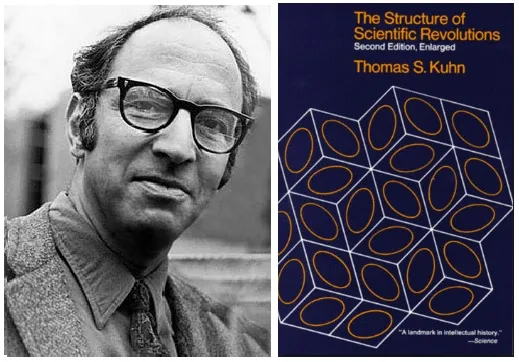Thomas Kuhn was a scientist who studied how science changes over time. He managed to develop some significant ideas about this process:
- Paradigms in Science:
Kuhn stated that most scientists work within a paradigm, which is like a set of rules and ideas that everyone agrees on. Scientists try to solve problems and answer tough questions using these rules. For example:
- In biology, the theory of evolution is a paradigm. Scientists conduct experiments and studies based on this theory of how living things change over time.
- In physics, quantum mechanics is a paradigm that describes how things work at a very tiny scale.
- General relativity is another paradigm that explains gravity and how space and time work together.

- Paradigm Shifts:
Scientific revolutions happen when scientists find problems that can’t be solved with the current rules. This can sometimes lead to a crisis. When this happens, a new set of rules (a new paradigm) might be created. For instance:
- Before Einstein, physics followed Newton’s laws. But some experiments with light and electricity didn’t fit Newton’s ideas. This led to a crisis, which Einstein solved with his theory of relativity – a whole new way of looking at the universe.
When a new paradigm takes over, it’s a significant change. It’s not like adding new information; it’s like changing the whole way scientists see the world. A good example of this is when people started believing the Earth went around the Sun instead of the other way around; it changed how they thought about everything in space.
To illustrate this concept, imagine you are playing checkers, and suddenly someone changes the rules to chess. Everything you knew about how to play has to change.
- Incommensurability:
Different paradigms are sometimes so different that it is hard to compare them directly. It’s as if they’re speaking different languages. - Scientific Progress:
Kuhn argued that science doesn’t always move in a straight line toward the truth. Instead, it changes direction when new paradigms take over. However, he still believed that newer theories are usually better at solving scientific puzzles. - Scientific Communities:
Kuhn also emphasized that science is done by groups of people. These communities decide what’s important to study and what counts as good science.
To illustrate these ideas further:
- The shift from Newtonian physics to Einstein’s relativity is a classic example of a paradigm shift. It changed how we think about space, time, and gravity.
- In medicine, the discovery of germs causing diseases was a huge paradigm shift. It changed everything from how doctors washed their hands to how we develop medicines.
- The theory of plate tectonics in geology was another big shift. It explained earthquakes, mountain formation, and the shape of continents in a whole new way.
- In psychology, the shift from Freud’s psychoanalysis to more scientific, testable theories is an example of how a field can change its paradigm over time.
Kuhn’s ideas were revolutionary themselves! He made people think differently about how science works and changes over time. He showed that science isn’t just about collecting facts, but also about how scientists think about and interpret the world around them.
sources:
Kuhn’s Structure of Scientific Revolutions (marxists.org)
What Thomas Kuhn Really Thought about Scientific “Truth” | Scientific American
Possible Class Questions:
Based on the content of this article about Thomas Kuhn’s ideas, here are some thought-provoking questions you could bring up in class:
- How does Kuhn’s concept of paradigms challenge our traditional view of scientific progress?
- Can you think of any recent developments in science that might qualify as a “paradigm shift”?
- How might Kuhn’s ideas apply to fields outside of science, such as politics or economics?
- Do you agree with Kuhn that different paradigms are “incommensurable”? What are the implications of this idea?
- How does Kuhn’s view of science as a social activity, influenced by human factors, compare to the ideal of scientific objectivity?
- What are the potential dangers of misinterpreting or over-simplifying Kuhn’s ideas?
- How might Kuhn’s ideas about paradigm shifts affect how we teach science in schools?
- Do you think it’s possible for science to reach a state of “permanent normalcy” as Kuhn suggested? What might that look like?
- How does Kuhn’s view of scientific progress compare to Karl Popper’s idea of falsification?
- What are the ethical implications of Kuhn’s ideas, especially regarding how we view scientific “truth”?
- How might Kuhn’s ideas about the limits of communication between paradigms relate to current issues in cross-cultural or interdisciplinary communication?
- Can you think of any examples from your own field of study that illustrate Kuhn’s ideas about paradigms and scientific revolutions?
These questions can help stimulate discussion about the nature of scientific progress, the role of paradigms in shaping our understanding, and the broader implications of Kuhn’s ideas for how we think about knowledge and truth.










Leave a Reply